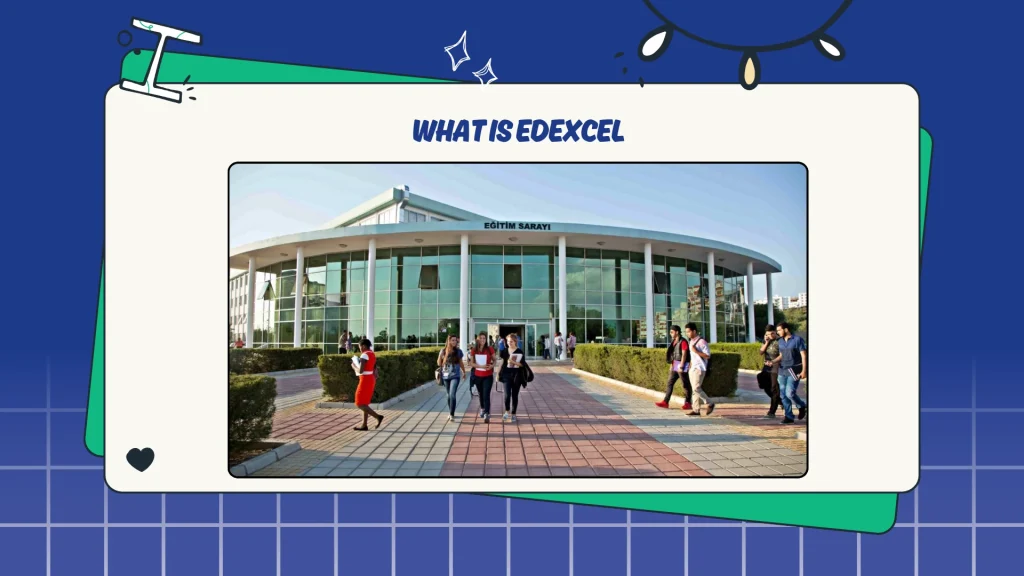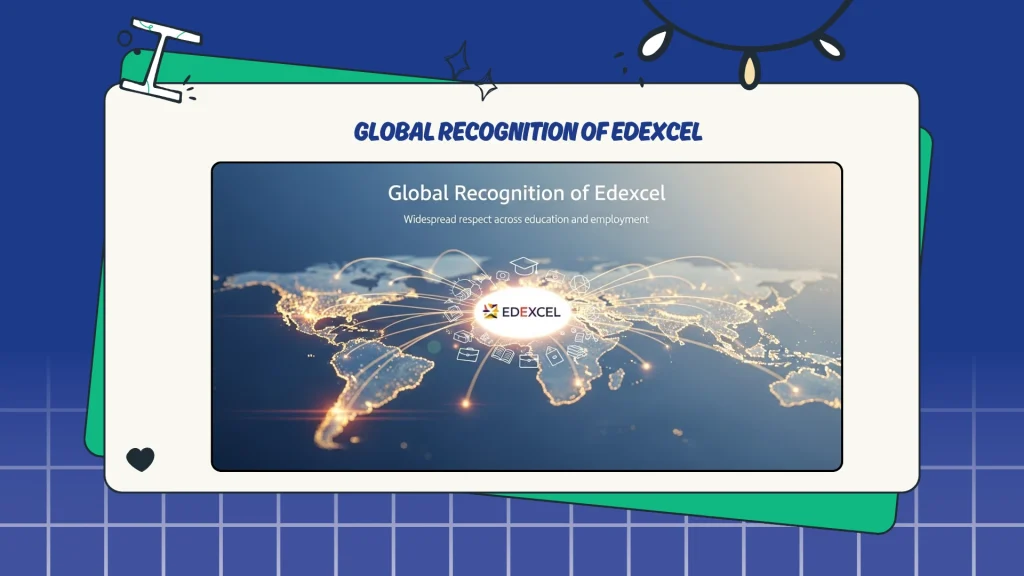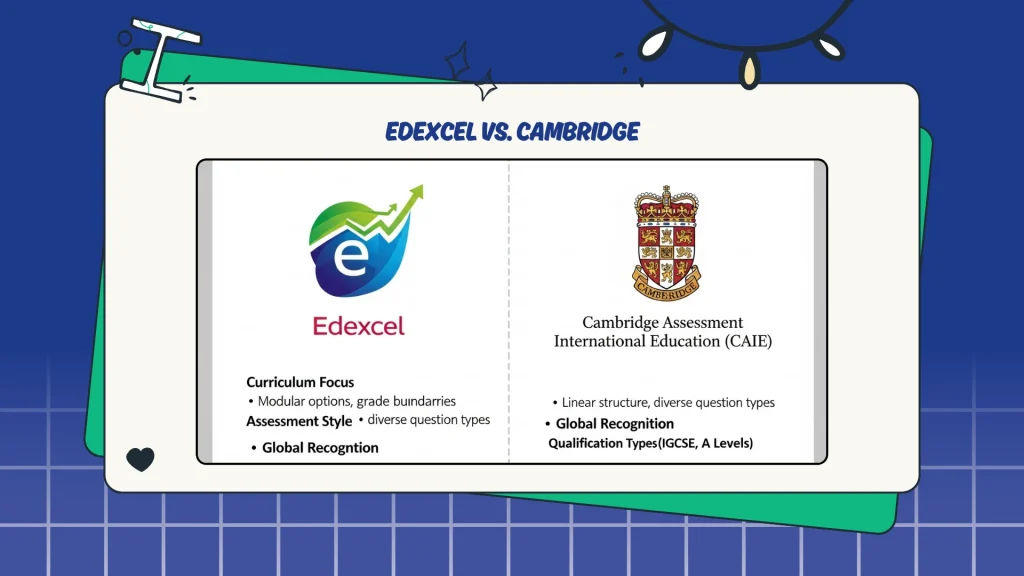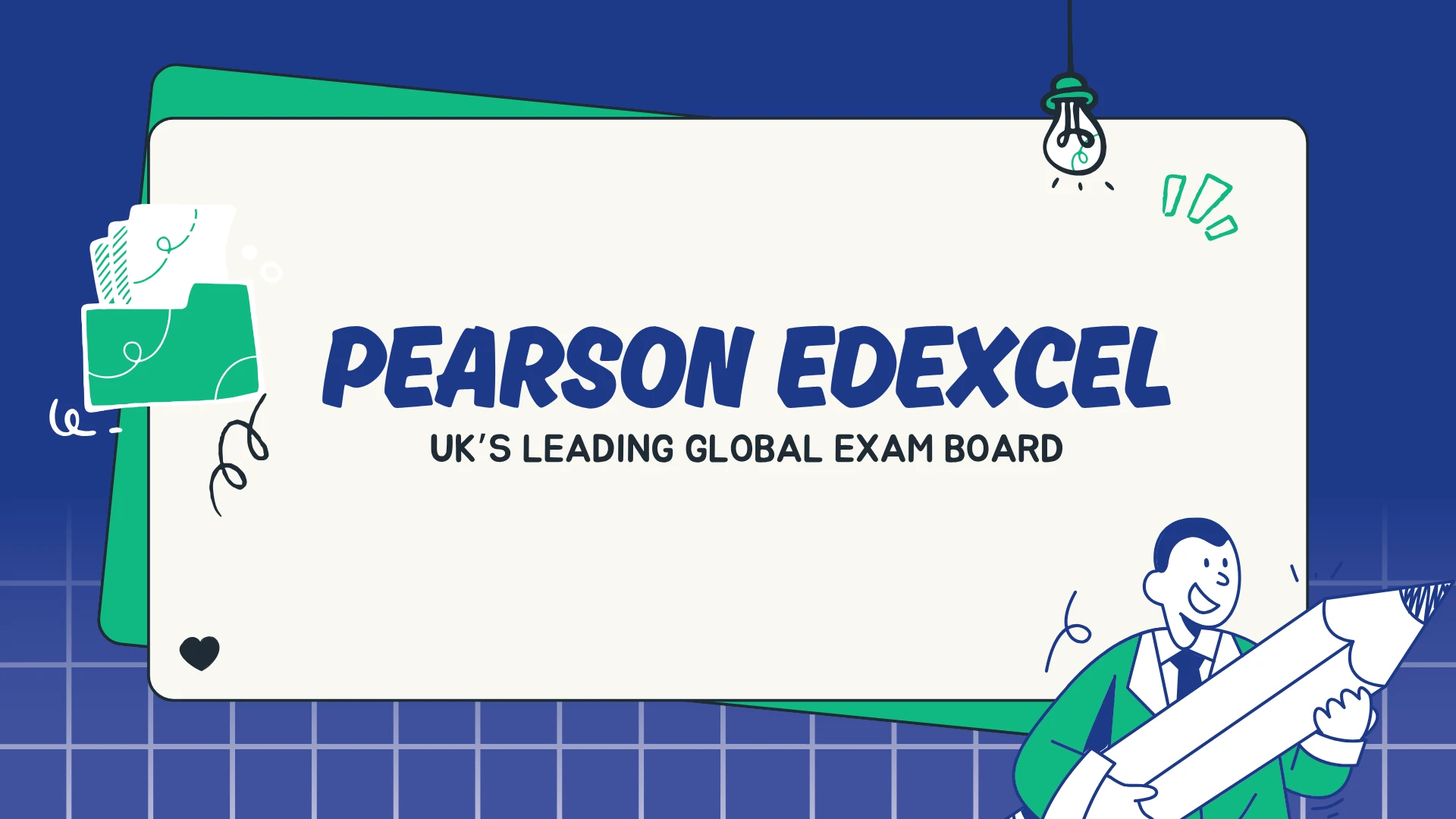Choosing Edexcel means choosing quality education backed by a trusted name in academia and vocational training. It empowers students to unlock their full potential, broadens their horizons, and prepares them to meet the challenges of the future with confidence and competence.
If you are looking for a well-rounded, globally recognized qualification that opens doors to countless opportunities, Edexcel is definitely the right choice.
Edexcel, officially known as Pearson Edexcel, is a UK-based examination board offering internationally recognized academic and vocational qualifications. Owned by Pearson, one of the world’s leading education companies, this provides students with high-quality, globally respected credentials such as GCSEs, IGCSEs, A Levels, and BTECs.
These qualifications are trusted by top universities and employers around the world, making a popular choice for students who aspire to achieve academic excellence and career readiness. Whether you’re preparing for university admission or gaining hands-on skills for the workplace, Edexcel offers a flexible and comprehensive learning pathway tailored to your goals.
What sets Edexcel apart is its unique combination of academic rigor and real-world relevance? While many boards focus solely on theoretical knowledge, it blends subject depth with practical skills, ensuring that learners are not only exam-ready but also life-ready.
Whether a student aims for higher education in top universities around the world or seeks a professional pathway through skill-based qualifications, It provides a solid foundation for future success.
The curriculum is designed to be learner-focused, flexible, and globally relevant, making it a preferred choice for international schools, private candidates, and educational institutions. Its qualifications are recognized by leading universities in the UK, USA, Canada, Australia, Europe, and beyond. Moreover, This is constantly evolving its standards to meet the demands of modern education, including digital assessments, updated syllabi, and a strong emphasis on 21st-century skills such as communication, creativity, collaboration, and critical thinking.
What is Edexcel?

Edexcel is a UK-based examination board that offers internationally recognized academic and vocational qualifications. It is part of Pearson, the world’s largest education company. This provides a variety of programs such as:
- GCSEs (General Certificate of Secondary Education)
- IGCSEs (International GCSEs)
- AS and A Levels (Advanced Level qualifications)
- BTECs (Business and Technology Education Council vocational qualifications)
Edexcel’s qualifications are designed to suit a wide range of students, from those pursuing higher education to those looking to develop practical, career-focused skills.
Globally respected and widely accepted by universities and employers, it offers a flexible and modern curriculum that encourages critical thinking, problem-solving, and real-world application of knowledge. It is used in schools and colleges across more than 90 countries, making it one of the most trusted and recognized international education systems today.
Edexcel Qualifications Overview
Edexcel, as part of Pearson, offers a comprehensive suite of internationally recognized academic and vocational qualifications. These programs are designed to accommodate diverse learning needs and career aspirations, providing a structured pathway from foundational education to higher academic study or professional development.
1. GCSEs (General Certificate of Secondary Education)
GCSEs are typically pursued by students aged 14 to 16 in the United Kingdom and select international institutions. These qualifications cover a broad spectrum of subjects, including but not limited to English, Mathematics, Sciences, and Humanities. GCSEs serve as a foundational stage, preparing students for advanced qualifications such as A Levels or vocational programs. Assessment is conducted through examinations.
- Typically taken by students aged 14–16 in the UK and some international schools.
- Covers a wide range of subjects including English, Mathematics, Science, History, Geography, and more.
- Designed to provide foundational knowledge before progressing to A Levels or vocational study.
- Grading scale: 9 (highest) to 1 (lowest).
2. International GCSEs (IGCSEs)
International GCSEs are tailored for students outside the United Kingdom. They maintain the same academic rigor as GCSEs but with global content and assessment adaptations to suit diverse educational contexts. IGCSEs are widely accepted by universities and are offered in numerous subjects such as Biology, Chemistry, Physics, Business Studies, Economics, and Information & Communication Technology. These qualifications are particularly popular in international schools and private educational institutions.
3. AS and A Levels (Advanced Subsidiary and Advanced Level)
AS and A Levels are advanced academic qualifications aimed at students aged 16 to 19. The AS Level is typically completed in the first year of post-secondary education, while the A Level encompasses two years of study, combining AS and A2 components. These qualifications enable students to specialize in subjects aligned with their future academic or career goals, such as Mathematics, Economics, Psychology, or Computer Science. A Levels are globally recognized and serve as a primary qualification for university admission. Grading ranges from A to E*, with U indicating “Unclassified.”
4. BTEC Qualifications (Business and Technology Education Council)
BTEC qualifications offer a vocational route for students seeking practical, industry-focused education. These programs are available across various sectors, including Business, Engineering, Health and Social Care, Creative Media, and Information Technology. BTECs are available at multiple levels:
- Level 1–2: Equivalent to GCSEs
- Level 3: Equivalent to A Levels
- Levels 4–7: Correspond to Higher National Certificates and Diplomas (HNC/HND)
BTECs combine coursework, real-world projects, and practical assessments, and are recognized by both universities and employers for their emphasis on applied learning.
5. Functional Skills and Professional Certifications
Edexcel also provides qualifications in core skills such as English, Mathematics, and ICT, aimed at improving adult literacy and employability. In addition, Pearson offers sector-specific training and professional certifications in areas such as education, management, and technology.
Global Recognition of Edexcel

Edexcel qualifications enjoy widespread recognition and respect across the global education and employment landscape. As part of Pearson, it ensures that its academic and vocational programs meet rigorous international standards, enabling students to confidently pursue higher education and career opportunities worldwide.
University Recognition
Edexcel qualifications, including IGCSEs, A Levels, and BTECs, are accepted by leading universities in countries such as:
- United Kingdom (including Oxford, Cambridge, Imperial College, and the entire UCAS network)
- United States (including Ivy League institutions)
- Canada (University of Toronto, McGill, UBC, etc.)
- Australia (University of Sydney, Monash University, etc.)
- Europe (various institutions across Germany, France, the Netherlands, and beyond)
- Asia and the Middle East (including top-ranked universities in the UAE, Singapore, and Hong Kong)
These qualifications are considered equivalent to local high school diplomas and meet the entry requirements for undergraduate programs across disciplines.
Employer Recognition
Edexcel’s academic and vocational programs are also highly valued by employers across industries. Qualifications such as BTEC diplomas are known for their focus on practical application, technical knowledge, and workplace readiness, which makes them especially relevant for students entering the job market or seeking professional certifications.
Employers recognize Edexcel graduates as individuals equipped with:
- Strong problem-solving and analytical thinking skills
- Effective communication and collaboration abilities
- Practical knowledge and hands-on experience relevant to a specific field
Global Opportunities
Whether students aim to study abroad, gain scholarships, apply for international internships, or migrate for employment, Edexcel qualifications offer a globally portable credential that supports their ambitions.
Edexcel vs. Cambridge (CAIE)

Both Edexcel and Cambridge Assessment International Education (CAIE) are prestigious UK-based examination boards that offer internationally recognized qualifications such as IGCSEs and A Levels. While both systems aim to maintain academic excellence and global standards, they differ in certain key areas, including structure, assessment methods, and flexibility.
Which Board Should You Choose?
- Choose Edexcel if you prefer:
- Modular exams and flexibility in assessments
- Career-oriented pathways (BTEC)
- Coursework-based evaluation
- Choose CAIE if you prefer:
- A more traditional, exam-focused academic approach
- A broader academic subject range
- Alignment with the University of Cambridge brand
Both Edexcel and CAIE offer high-quality education frameworks that prepare students for global success. The choice between them depends on the student’s learning style, academic goals, and preferred assessment method. For some, flexibility and vocational pathways may be ideal, while others may benefit from CAIE’s rigorous and traditional academic structure.
Edexcel Exam Sessions
Edexcel offers multiple exam sessions throughout the year to accommodate the diverse needs of students worldwide. These sessions provide flexibility and ensure timely assessment and results.
- January Session: Available for select qualifications and subjects, primarily for international candidates.
- May/June Session: The main examination period covers a broad range of qualifications, both academic and vocational.
- October Session: Offered internationally for certain subjects, allowing students additional opportunities to sit for exams.
Results Release Timeline
- August: Results for the May/June exam session are typically released in August.
- March or November: Results for the January and October sessions are usually made available in March or November, respectively.
This structured exam schedule enables students to plan their studies effectively and align their academic progress with university application deadlines and career plans.
Edexcel Grading System
Employs distinct grading schemes tailored to the various qualifications it offers, ensuring clarity and consistency in evaluating student performance across academic and vocational programs.
- GCSEs and IGCSEs: Graded on a numerical scale from 9 to 1, where 9 represents the highest achievement and 1 the lowest passing grade. This scale replaces the traditional letter grades to provide greater differentiation at the top end of the grade spectrum.
- AS and A Levels: Assessed using the traditional letter grading system from A to E*, with A* denoting exceptional performance and E representing the minimum passing grade. A grade of U (Unclassified) indicates that the student’s performance did not meet the required standard.
- BTECs (Vocational Qualifications): Graded using a tiered system that reflects the level of achievement:
- Pass
- Merit
- Distinction
- Distinction* (the highest grade, signifying outstanding performance)
This grading framework supports accurate assessment of students’ knowledge, skills, and competencies, facilitating progression to further education or employment.
Equivalence of Edexcel Qualifications in Pakistan (IBCC)
In Pakistan, students who complete Edexcel qualifications such as O Levels and A Levels must obtain equivalence certificates from the Inter Board Committee of Chairmen (IBCC) to ensure their international qualifications are recognized by local educational institutions and universities.
Purpose of IBCC Equivalence
The IBCC equivalence process serves to:
- Validate foreign qualifications against the Pakistani education system’s standards.
- Convert Edexcel grades into corresponding Pakistani marks or percentages.
- Enable students to pursue higher education within Pakistan or apply for government jobs, scholarships, and professional courses.
Process of Obtaining Equivalence
- Submission of Documents: Students must submit their original Edexcel certificates, mark sheets, and relevant application forms to the IBCC office.
- Verification: IBCC verifies the authenticity of certificates directly with Edexcel or through authorized channels.
- Equivalence Issuance: Upon successful verification, IBCC issues an equivalence certificate stating the Pakistani equivalent of the qualification.
Importance for Students
- Equivalence is mandatory for admission in Pakistani universities and colleges.
- It facilitates recognition of O Level and A Level qualifications for government and private sector employment.
- Ensures eligibility for professional programs and scholarships within Pakistan.
Why Choose Edexcel?
Edexcel stands out as a premier examination board offering a range of academic and vocational qualifications that cater to diverse learner needs. Here are several reasons why students and educators prefer on this:
- Skill-based education that meets modern industry demands.
- Strong support from digital tools, sample papers, and training resources.
- Adaptable learning style for different kinds of learners.
- Edexcel BTECs offer a career-ready pathway for non-traditional students.
Choosing equips learners with a robust, globally respected qualification framework designed to foster academic excellence and career readiness in an ever-evolving world.
Edexcel 2025 Updates
As part of its commitment to maintaining world-class standards and responding to evolving educational needs, This is introducing several key updates in 2025 aimed at enhancing learning experiences and assessment quality:
1. Introduction of Digital Learning Formats and Assessments
Edexcel is expanding its use of digital platforms to facilitate more interactive and accessible learning. This includes online resources, virtual laboratories, and digital assessments that provide immediate feedback and flexible exam formats. The integration of technology supports diverse learning styles and promotes greater engagement.
2. Curriculum Revisions in Key Subjects
Significant updates have been made in subjects such as Mathematics, Computer Science, and the Sciences to better align content with current and future global job market demands. These revisions emphasize practical skills, problem-solving, data literacy, and technological competencies essential for success in the 21st century.
3. Commitment to Fairness, Transparency, and Inclusivity
Edexcel continues to refine its assessment processes to ensure fairness and transparency for all candidates. Efforts include improved marking schemes, clear grading criteria, and accommodations for diverse learner needs. This approach promotes an inclusive educational environment where every student has the opportunity to demonstrate their abilities effectively.
These updates reaffirm dedication to providing relevant, high-quality education that prepares learners for both higher education and the dynamic global workforce.
Conclusion
Edexcel stands as a trusted name in education, blending academic excellence with career readiness. Whether you’re targeting university admissions or industry success, Edexcel qualifications open doors to a bright future. With flexible subject choices, global recognition, and a learner-centric approach, its empowers students to learn, grow, and succeed in a fast-changing world.
Edexcel is much more than just an examination board; it represents a comprehensive educational pathway that equips students with both academic knowledge and practical skills necessary to thrive in today’s competitive global environment.
For students in Pakistan and other countries, This also offers a reliable bridge to local and international education systems, especially when paired with the necessary equivalence certifications from bodies like IBCC. This makes it an accessible and beneficial choice for ambitious learners aiming to excel both locally and globally.
Frequently Asked Questions (FAQs)
Is Edexcel harder than CAIE?
Both Edexcel and CAIE are respected exam boards offering rigorous academic qualifications. The perceived difficulty depends on the student’s learning style. Edexcel often uses a modular assessment system, allowing students to take exams in parts, which some find helpful. CAIE generally follows a linear system with exams at the end of the course. Ultimately, success depends on the student’s preparation and understanding of the subject.
Can Edexcel students apply to international universities?
Yes, Edexcel qualifications such as IGCSEs and A Levels are widely accepted by universities around the world, including those in the UK, USA, Canada, Australia, and Europe. Edexcel’s reputation for high academic standards makes it a trusted choice for university admissions and scholarship applications globally.
Is a BTEC qualification equivalent to A Levels?
Yes, BTECs are vocational qualifications that are considered equivalent to A Levels at Level 3. Many universities accept BTEC qualifications for admission, especially for courses related to the vocational subject studied. BTECs focus more on practical skills and continuous assessment, making them a good alternative for students who prefer coursework over final exams.
Can Edexcel qualifications be studied privately without attending a school?
Yes, students can register as private candidates through authorized exam centers such as the British Council or other accredited institutions. This option allows learners to study independently or with tutors and take Edexcel exams without being enrolled in a formal school program.
Is Edexcel available in Pakistan, and how can students register?
Edexcel is available in Pakistan through authorized exam centers, including the British Council and certain private schools. Students can register for exams through these centers, which provide information on exam schedules, fees, and preparation resources. It is important to register before the deadline to ensure eligibility for the exam session.
How are Edexcel exams assessed?
Edexcel assessments vary by qualification but often include a combination of written exams, coursework, and practical assessments. For example, BTECs emphasize continuous assessment through projects and assignments, whereas GCSEs and A Levels mainly rely on final exams, with some subjects offering coursework components.
What support resources are available for Edexcel students?
Edexcel and Pearson provide a wide range of support materials, including textbooks, past papers, examiner reports, and online learning platforms. Many schools and centers also offer workshops, revision classes, and tutoring to help students prepare effectively.
How does the grading system work for Edexcel qualifications?
For GCSE and IGCSE, the grading scale is from 9 (highest) to 1 (lowest), replacing the old A* to G system to provide more differentiation at the top levels. For AS and A Levels, grading remains A* to E, with U (unclassified) indicating a fail. BTECs use a Pass, Merit, Distinction, and Distinction* grading scheme, reflecting the quality of work.
What is the difference between the January and May/June Edexcel exam sessions?
The May/June session is the main exam period for most Edexcel qualifications and is available worldwide. The January session is offered for selected subjects and is more common in certain regions. Students should confirm which session applies to their course and plan their studies accordingly.
How do Edexcel qualifications compare with local Pakistani boards?
Edexcel qualifications offer a more internationally focused curriculum and assessment style, emphasizing understanding and application rather than rote memorization. They provide better recognition for overseas university admissions and are often preferred by students planning to study abroad.





